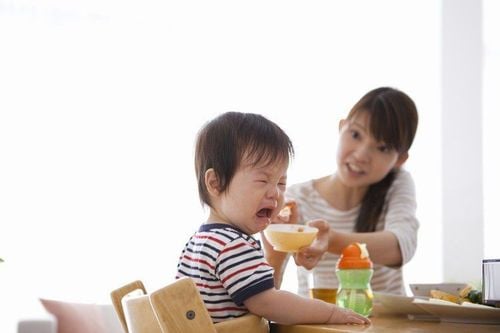This is an automatically translated article.
Children are in the period of both physical and intellectual development, so their meals are always focused to ensure enough nutrients. However, the fact that children are suddenly anorexic or lazy to eat is a common problem that worries many parents. Knowing the causes of anorexia will help your baby eat well and grow up healthy.
1. Causes of sudden anorexia in children
Anorexia is defined as when the baby eats less than usual, refuses to eat some or all foods, the meal lasts more than 30 minutes, does not have enough necessary nutrients, to the usual meal. shows fear of eating or crying and running away as well as vomiting when seeing food. Children suddenly anorexia is a fairly common condition found in all ages, especially children of weaning age, preschool age.
There are many causes of sudden anorexia in children, usually divided into the following 4 main groups:
1.1. Psychological reasons for children to suddenly become anorexic
Psychological problems can be the cause of children's natural anorexia.
Children are not interested, even afraid of eating because their parents force them to eat or threaten them. Children are under pressure about weight gain, which is common during puberty. Children have stress and discomfort that give rise to anorexia. For example, the pressures of studying, taking exams, being abused, being sexually abused. Children who have a sad story such as a parent's divorce or the loss of a family member can also cause anorexia.
1.2. Physiological anorexia causes
In the process of development, there are periods when the physiological changes of the body make children naturally lazy to eat, do not want to eat or eat less. That stage is called physiological anorexia, the main cause is due to internal changes in the child's development. For example, for children under 1 year old, there are times when children suddenly lose their appetite due to physiological changes in the body such as learning to turn over, sitting, teething, learning to stand, learning to walk, ...
In fact, anorexia caused by physiology can occur depending on each stage of the child's development and also varies to different degrees. However, in general, physiological anorexia is common in the following stages of development:
Teething stage: From 6 to 8 months old, the baby will grow the first milk teeth. Depending on the location of each baby, the body will react mildly or strongly to the phenomenon of teething. Some children only have a mild fever for a while, some have a high fever continuously, suddenly become anorexic or stop eating for a few days. After that, your baby will eat and suckle normally again. Kindergarten stage: From about 16 to 18 months old, children already know how to walk and run, love to learn and explore around. Besides, psychological causes can also contribute to children suddenly anorexia during this period. The change of environment from being at home with parents to going to daycare makes children feel down, so they don't like to eat. Age 3: The 3-year-old stage is a milestone marking the strong development of perception and observation. Children often imitate the actions of adults and make comparisons with their peers. At this stage, children also recognize themselves as different from others, as a separate individual. Children are more self-sufficient, want to do things on their own and do not like help from others. The age of 3 is also a period of emotional development. In the above stages, anorexia can happen suddenly. This is anorexia physiologically caused by changes in the normal development process. The baby's anorexia may be temporary and return to normal later, so parents do not need to be too worried. For teething, it is possible that the baby will eat and drink normally again after a few days or a week, but for other stages the physiological anorexia may last longer. However, if the baby's anorexia lasts for many weeks, it is necessary to pay attention to follow up to find out the cause and have solutions to overcome it soon, to avoid forming the habit of lazy eating later.

Trẻ tự dưng biếng ăn có thể do bé sẽ mọc răng sữa
1.3. The cause of the child's anorexia is pathological
Baby suddenly anorexia can also be due to medical reasons. When suffering from acute diseases caused by viral or bacterial infections of the respiratory tract, gastrointestinal tract (gastritis, intestinal infection, nasopharyngitis, tonsillitis, otitis media, bronchitis, pneumonia,... ) causes fever, cough, sore throat, fatigue... leading to anorexia. Children lack micronutrients such as protein, lysine, iron, zinc, magnesium, vitamins A, B, C, ... also make children anorexic. In young children, antibiotic treatment easily disrupts the intestinal microflora and causes physical damage to the baby's immature digestive system, causing gas, bloating, and indigestion.
1.4. Caused by boring menu or unscientific way of eating
Diet and unhealthy habits that parents inadvertently create for babies are the most common causes of anorexia.
Children's sudden anorexia may be due to the menu being unattractive, boring, the dishes are not delicious, repetitive, so they do not stimulate the child's taste. Therefore, parents need to change dishes often, decorate them with eye-catching decorations to make them more excited. Food and processing methods are not suitable for the age of each stage of the baby's development. For example, giving your baby solid foods too early before 6 months of age, feeding them rice when their teeth have not yet grown enough to chew, or if the child is 2-3 years old but still has porridge, crushed or pureed rice. Feed your baby spontaneously, without a fixed time or inappropriate eating time, for example when the baby is full. Letting children eat sweets, soft drinks, fast food makes them not feel hungry when it comes to main meals. Babies eat while watching TV, phones or playing games, making them lose focus on eating, eat slowly, eat less, don't feel the taste of food and forget about cravings. Your baby's mealtime lasts longer than 30 minutes. Do not let children eat meals with the family, so they do not learn to follow the eating habits of adults, they do not feel the joy of eating, are not encouraged.
2. Consequences of children suddenly anorexia
Anorexia not only affects children's health, slows down weight gain and height growth, but also causes many growth disorders, making children more susceptible to acute and chronic diseases, which over time will psychological effects on children.
First, children with anorexia will slowly gain weight, even lose weight. If anorexia persists for a long time, it will affect both physical and intellectual development, making children inferior to their peers.
Moreover, due to anorexia, the body is not provided with adequate and diverse nutrients as well as necessary vitamins and minerals. Children will not have enough energy, lack many nutrients such as protein, calcium, magnesium, iron, zinc, vitamin E, vitamin C and fiber, leading to malnutrition, short stature. Not only that, lack of nutrients will reduce immunity, poor resistance, making children more susceptible to infections, falling into a pathological spiral. According to statistics from the National Institute of Nutrition, when children do not eat enough nutrients, poor resistance will have 29% more days of illness and 45% more risk of upper respiratory tract infections than children. have good resistance.
Micronutrient deficiency also causes anemia due to lack of iron, vitamin B12 and folic acid, making children pale, often tired, poor concentration in school and low IQ. At the same time, children with prolonged anorexia also have psycho-emotional disorders, due to the pressure of being stuffed with food from their parents. In order to escape, the baby often pretends to be nauseous, having stomachache when seeing food, gradually forming a natural reflex. At this time, children not only have psychological problems but also are prone to gastrointestinal diseases, typically gastritis.
Anorexia not only affects children's health and development, but also causes anxiety and stress for parents. The more children refuse to eat, the more worried parents are and trying to force them to eat by all means or the meal lasts up to 2-3 hours will make the parents more stressed, tired, and easily angry.

Tình trạng trẻ tự dưng biếng ăn có thể ảnh hưởng đến miễn dịch của bé
3. Measures to overcome the situation of anorexia children
Only when correctly determining the cause of the child's natural anorexia can a solution be found.
Check the child's abnormal signs to rule out pathological anorexia. For example fever, bloating, indigestion, belching, heartburn or any other unusual health symptoms. Check on changes around your baby such as milk, weather, living environment, learning, including caregivers. Check the child's mood changes, such as often crying, often sulking, upset,... If it is determined that the child's anorexia is not due to psychological and pathological causes, but the child is anorexic. Due to reasons or improper diet, parents should change the way of care and adjust eating habits scientifically to help children overcome anorexia. Dishes should be diverse in terms of both ingredients and processing methods, frequently changing dishes. Food must be fresh, used within the day. Eat a meal that cooks that meal, limit reheating food many times, it will lose nutrients. You should learn about your baby's eating needs, preferences and tastes to prepare the right food. It is advisable to divide the amount of food into several meals to reduce the amount of food in each meal. Decorating food eye-catching and lively will make children feel more excited and eat more deliciously. Should add more yogurt, fruit, cheese, whey to the side meals, alternating between the main meals. Fruit is both sweet and full of nutrients, which can stimulate children's taste buds. Do not eat while watching TV and phone, playing with toys or walking around. At meals, parents should let their children sit at the dining table with the family. Each meal should not last more than 30 minutes. Do not try to force the child to eat even if he does not finish eating or eats for more than 30 minutes. While eating, should praise and encourage the child to be more interested in eating. When a child's anorexia persists for a long time or has unusual signs, parents should take the child to a reputable nutrition center to determine the exact cause and have appropriate solutions. Under the guidance of a doctor, parents can add micronutrients for children with anorexia and malabsorption. Should choose products with vitamins and minerals to help children absorb better, grow sustainably and be healthy. The improvement of symptoms can take place for a long time, so it is recommended that parents be calm and persistent when supplementing with nutrients for their children, either through food or functional foods. In particular, the use of functional foods should choose those of natural origin that are easily absorbed, do not allow simultaneous use of many types or continuously change the types of functional foods. In short, anorexia, refusing to eat some or all foods, meals lasting more than 30 minutes,... is a common condition in all ages, especially children weaning age, preschool age. There are many reasons why children suddenly become anorexic, so parents should find out the right reason to overcome this situation.
In addition to having a reasonable diet, your baby needs to add essential micronutrients such as: Zinc, selenium, chromium, vitamins B1 and B6, ginger, acerola fruit extract (vitamin C), ... to improve taste, eat well, reach the correct height and weight, and have a good immune system, strengthen the resistance to get sick less often and have less digestive problems.
The improvement of symptoms can take place for a long time, so it is recommended that parents be calm and persistent when supplementing with nutrients for children, even through eating or functional foods. In particular, the use of functional foods should choose those of natural origin that are easily absorbed, do not allow simultaneous use of many types or continuously change the types of functional foods.
To have more knowledge about taking care of children by age, you should regularly visit the website vimec.com and make an appointment with the leading doctors, Pediatricians - Nutritionists when you need advice.













